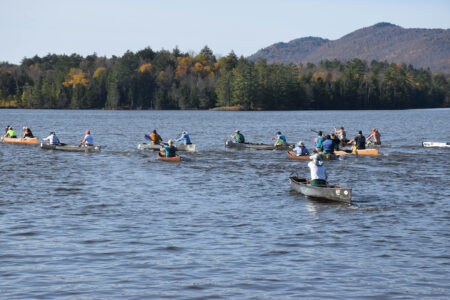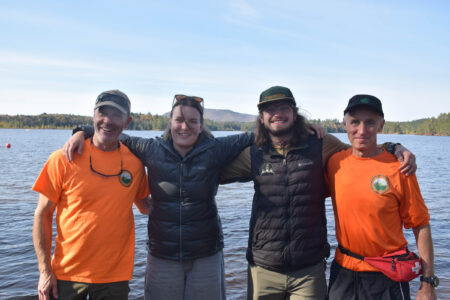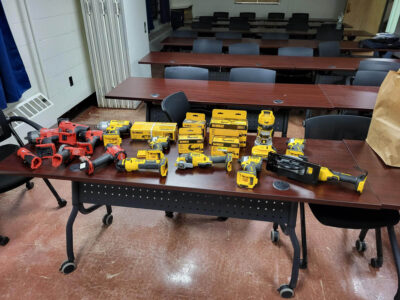Paul Smith’s race sees strong turnout, sense of community
- Paddlers take off at the start of the Roundin’ Regis Regatta on Lower St. Regis Lake on the shores of Paul Smith’s College on Sunday. (Enterprise photo — Chris Gaige)
- Roundin’ Regis Regatta race and safety officials smile at the start/finish line, with Lower St. Regis Lake in the background on Sunday at Paul Smith’s College. From left, Jeff Berry, Grace Hiltunen, Bailie Charette and Doug Goodfellow. Berry and Goodfellow are with Search and Rescue of the Northern Adirondacks, whose volunteer members provide safety and emergency response services in backcountry settings. (Enterprise photo — Chris Gaige)
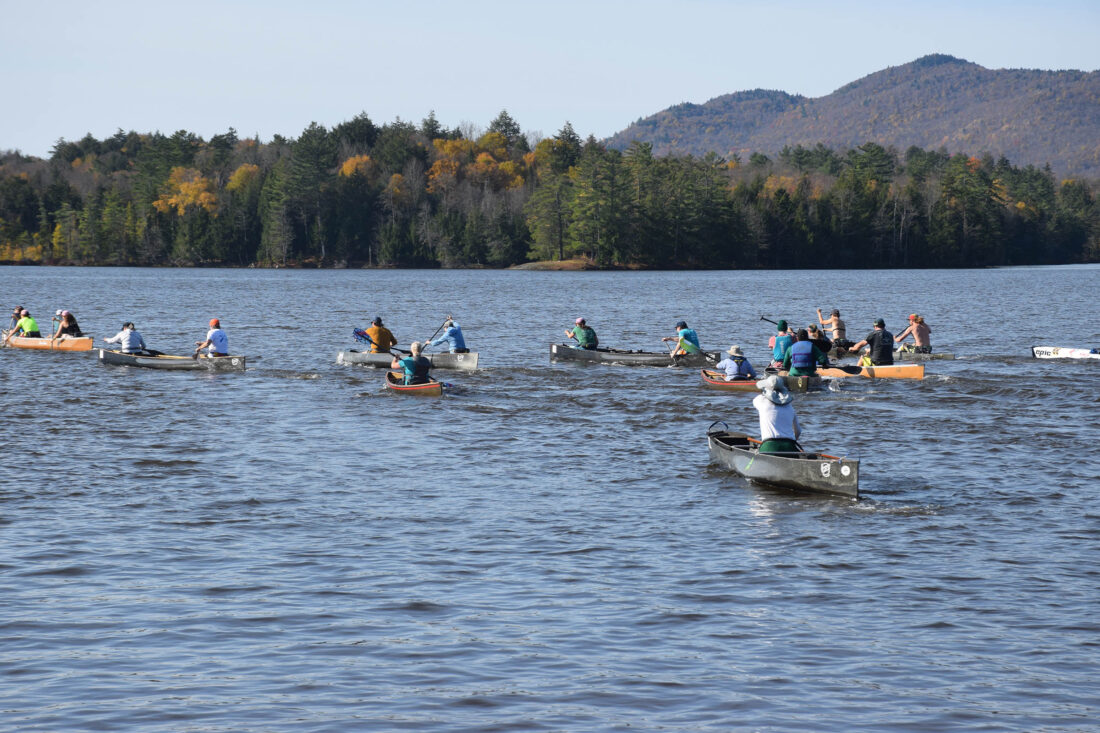
Paddlers take off at the start of the Roundin’ Regis Regatta on Lower St. Regis Lake on the shores of Paul Smith’s College on Sunday. (Enterprise photo — Chris Gaige)
PAUL SMITHS — It was all fun under the sun on the water for the first-ever Roundin’ Regis Regatta held Sunday at Paul Smith’s College as 23 boats zipped around an approximately 8-mile course on Lower St. Regis, Spitfire and Upper St. Regis lakes.
The course followed a loop, with an approximately one-mile overland carry, bringing boats back from the west shore of Upper St. Regis Lake back to Lower St. Regis Lake near Marvin Pond, where racers then paddled back across the lake to where they started.
The Roundin’ Regis Regatta marked a revival of the St. Regis Invitational, which made use of the same course but was stopped with the coronavirus pandemic. This year, students and college staff members teamed up to bring a marathon canoe race back to Paul Smith’s campus.
Despite the multiyear hiatus since hosting a race, the college is no stranger to marathon canoe racing. The Bobcats boast a perennial powerhouse of a marathon canoe racing team, regularly taking top honors for their boat classes at various Adirondack canoe races, such as the Adirondack Canoe Classic, commonly known as the “90-Miler” and the Long Lake Long Boat Regatta.
Even with the hosts’ successes, the Roundin’ Regis Regatta was as much about community as it was finishing times, said Grace Hiltunen, a graduate admissions counselor at Paul Smith’s who helped plan the race.
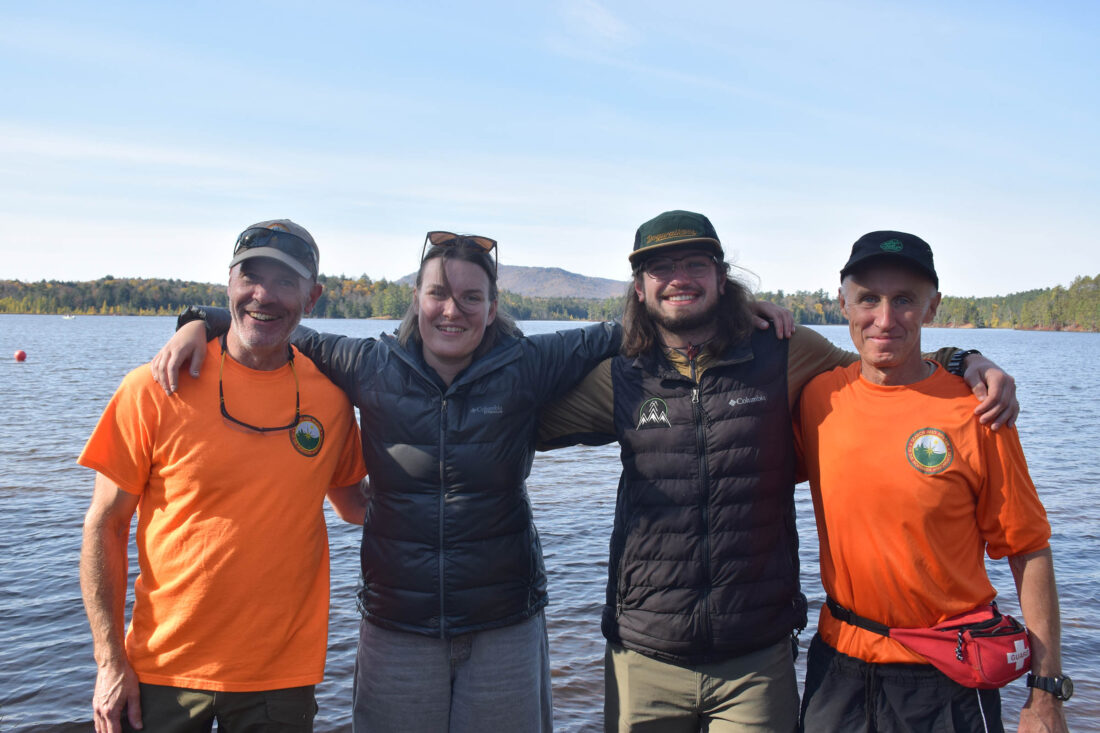
Roundin’ Regis Regatta race and safety officials smile at the start/finish line, with Lower St. Regis Lake in the background on Sunday at Paul Smith’s College. From left, Jeff Berry, Grace Hiltunen, Bailie Charette and Doug Goodfellow. Berry and Goodfellow are with Search and Rescue of the Northern Adirondacks, whose volunteer members provide safety and emergency response services in backcountry settings. (Enterprise photo — Chris Gaige)
“It’s really cool to see the paddling community come out, especially at the end of the season and especially for one of the races that’s not part of the (New York Paddlesports Racing Association’s) points system,” she said. “This is just for the community to have a good time and bring it back to the college.”
She noted that the sunny weather and warm temperatures helped to drive turnout, which included a lot of first-time racers holding out until the last-minute to make sure they weren’t racing in a downpour or even a snow shower, something not out of the question for late October.
Hiltunen said she appreciated how welcoming paddling is, regardless of experience, boat type and ability, and how seasoned veterans embrace newcomers.
“It’s really great to see how paddling is a really approachable sport to a large group of people,” she said. “It’s not a sport where I’ve seen much gatekeeping — it’s really anybody who wants to be involved and wants to get into it.”
Hiltunen added that since canoe racing draws people from far and wide, the races take on a social aspect, as paddlers reunite with friends who live far away and whom they haven’t seen, perhaps, since the last canoe race.
“It’s kind of like a family reunion every time,” she said.
While the 90-Miler is the banner race for the Adirondacks, drawing about 275 boats and over 600 racers, Hiltunen said it was a good indicator for the sport’s health that the smaller races throughout the Adirondacks have seen steady growth since the pandemic, demonstrating a sustained appetite, and commitment, to marathon paddle racing, as participants make a season out of it, going beyond just one race.
Race Director Bailie Charette, who is pursuing a master’s degree in Natural Resource Conservation, said planning the race wasn’t easy, noting that it required about a month of intensive course logistics, advertising and safety planning. It was a lot of moving parts and coordination with college officials to ensure the race was up to snuff, something Hiltunen echoed.
“Planning a canoe race in a month takes a lot,” she said. “But it’s really awesome to see the support that the college had for us. We had that backbone, which was really nice.”
Complete race results will be published in Tuesday’s Enterprise.

